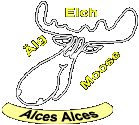
 |
The Name - Moose international ... |
It took me a while to understand confused glances from colleagues and
friends from all over the world when talking about the most
important animal - the moose - or : elk!
There are two English words for them: "moose" is US American
while "elk" is the British English version (deriving from the the German "Elch").
Confusing it gets as "elk" - US Version - is used for "Cervus
elaphus"! Lucky we have a clear latin version - which then ends up in
"deer" in British English.
To make it cristal clear for those visiting from all over the world : Here you can find the name of what we are talking about here:
|
|
United States (American English) | Moose | "Moose" origins from native inhabitants of North America: - Algonkian (Algonquin) Indians. "mons", "mos" or "moz" means "twig eater" |
|
|
GB (British English) | Elk | |
|
|
Germany (German) | Elch / Elen | |
|
|
Sweden (Swedish) | Älg | |
|
|
Finland (Finnish) | Hirvi | |
|
|
France (French) | Élan / l'orignal | "l'orignal" developped from Basque French explorers: orenac --> originac --> l'orignal |
|
|
Denmark (Danish) | Elg / Elsdyr | |
|
|
Italy (Italian) | Alce | |
|
|
Hungary (Hungarian) | Jávorszarvas | |
|
|
Norway (Norwegian) | Elg | |
|
|
Netherlands (Dutch | Eland | |
|
|
Poland (Polish) | Los / Tos | |
|
|
Portugal (Portuguese) | Alce | |
|
|
Russia (Russian) | Einu / Woss | |
|
|
Latvia (Letvian) | Poder | |
|
|
Lithuania (Lithuanian) | Briedis | |
|
|
Mongolia (Mongolian) | Khandgai | |
|
|
China (Chinese): | Milu (PIN-YIN: mi2 lu4)
|
|
|
|
Greece (Greek) | Mlkh | |
|
|
Iceland (Icelandic) | Elgur | |
|
|
Spain (Spanish) | Alce | |
|
|
Latvia (Latvian, Lettish) | Alnis | |
|
|
Romania (Romanian) | Elan | |
|
|
Luxembourg (Luxemburgish) | Elch | |
|
|
Estonia (Estonian) | Poder | |
|
|
Croatia (Croatian) | Los | |
|
|
Czech Republik (Czech) | Los | |
|
|
Slovenia (Slovenian) | Los |
The name "moose", used in North America, origins from the native inhabitants of that region - Algonkian (Algonquin) Indians. In their language "mons", "mos" or "moz" means "twig eater", what in fact is a quite good description of one of the major activities of them. Other First Nations from Canada or American Indians used similar words such as "moosh" or "moose". The step to the final word "moose" is not very far.
 |
Scientific/Taxonomic classification |
When investigating the following table I noticed differences of opinion in the literature regarding "subfamilia" and "genus". Whatever is correct I can't decide - potentially there is no right or wrong in this topic but just different opinions in the scientific world - here is one version:
| Scientific, Wissenschaftlich | Deutsch | English | |||
| REGNUM | Animalia | Reich | Tiere | Kingdom | Animals |
| PHYLUM | Chordata | Stamm | Chordatiere | Phylum | Chordates |
| Subphylum | Vertebrate | System | Wirbeltiere | Sub-Phylum | Vertebrate |
| CLASSIS | Mammalia | Klasse | Säugetiere | Class | Mammals |
| Subclassis | Theria | Unterklasse | Eigentliche Säuger | Sub-Class | Therian mammals |
| Infraclassis | Eutheria | Teilklasse | Höhere Säuger | Infra-Class | Placental mammals |
| Superordo | Paraxonia | Überordnung | Spreizzeher | Super-Order | Even-toed ungulates |
| ORDO | Artiodactyla | Ordnung | Paarhufer | Order | Artiodactyls, Even-toed ungulates |
| Subordo | Ruminantia | Unterordnung | Wiederkäuer | Suborder | Ruminents |
| FAMILIA | Cervidae | Familie | Hirsche | Family | Deer |
| Subfamilia | Alcinae | Unterfamilie | Elchhirsche | Subfamily | Moose deer |
| GENUS | Alces | Gattung | Elche | Genus | Moose |
| SPECIES | Alces alces | Art | Elch | Species | Moose (GB: Elk) |
If you are looking for the different sub-species - check in the section
" Habitat & Species"
Habitat & Species"